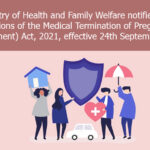In a recent Notification No. S.O. 4715(E), the Central Government has finally given effect to the provisions of the Human Immunodeficiency Virus and Acquired Immune Deficiency Syndrome (Prevention and Control) Act, 2017 [Act] as on 10th September, 2018.
This Act received the assent of the President way back on 20th April, 2017 but has finally gained the force of law on 10th September, 2018.
About and Objective:
The Act addresses the three-fold requirements of:
- Preventing and Controlling the Human Immunodeficiency Virus and Syndrome.
- Protecting and securing the human rights of persons who are HIV positive, affected by Human Immunodeficiency Virus and Acquired Immune Deficiency Syndrome and vulnerable to the said virus and syndrome;
- Provide effective care, support and treatment for Human Immunodeficiency Virus and Acquired Immune Deficiency Syndrome;
Important terms defined in the Act:
Person
Section 2(p) “person” includes an individual, a Hindu Undivided Family, a company, a firm, an association of persons or a body of individuals,whether incorporated or not, in India or outside India, any corporation established by or under any Central or State Act or any company including a Government company incorporated under the Companies Act, 1956, any Limited Liability Partnership under the Limited Liability Partnership Act, 2008, any body corporate incorporated by or under the laws of a country outside India, a co-operative society registered under any law relating to co-operative societies, a local authority, and every other artificial juridical person
Protected Person
Section 2(s) “protected person” means a person who is – (i) HIV-Positive; or (ii) ordinarily living, residing or cohabiting with a person who is HIV-positive person; or (iii) ordinarily lived, resided or cohabited with a person who was HIV- positive;
Reasonable Accommodation
Section 2(t) “reasonable accommodation” means minor adjustments to a job or work that enables an HIV-positive person who is otherwise qualified to enjoy equal benefits or to perform the essential functions of the job or work, as the case may be)
Key Highlights capturing a few compliances on the part of every person to carry forward the obligations framed under this Act:
- Prohibition of discrimination against protected persons i.e. HIV positive persons and those living / having lived with HIV positive persons
- a) No person should discriminate against protected persons including by denying/ terminating from employment or occupationunless the following conditions exist:
- i) a qualified and independent healthcare service provider who is competent to do so gives a written assessment that the protected person poses a significant risk of transmission of HIV to other person in the workplace, or is unfit to perform the duties of the job.
ii)Employer gives a written statement explaining the nature and extent of administrative or financial hardship for not being able to provide reasonable accommodation
[ In cases of failure to furnish the written assessment under subclause (i) of clause (a), it shall be presumed that there is no significant-risk and that the person is fit to perform the duties of the job, as the case may be, and in case of the failure to furnish the written statement under sub-clause (ii) of that clause, it shall be presumed that there is no such undue administrative or financial hardship].
- Prohibition of unfair treatment in or in relation to employment or occupation
- Prohibition of denial or discontinuation of, or, unfair treatment in healthcare services
- Prohibition of denial or discontinuation of, or unfair treatment in educational establishments and services
- Prohibition of denial or discontinuation to hold private office;
- Prohibition of the denial of access to, removal from, or unfair treatment in private establishment in whose care or custody a person may be;
- Prohibition on the isolation or segregation of a protected person;
- Prohibition of HIV testing as a pre-requisite for obtaining employment, or accessing healthcare services or education or, for the continuation of the same or, for accessing or using any other service or facility:
- Prohibition on certain acts propagating hatred, discrimination or physical violence
No person shall, by words, either spoken or written, publish, propagate, advocate or communicate by signs or by visible representation or otherwise the feelings of hatred against any protected persons or group of protected person in general or specifically or disseminate, broadcast or display any information, advertisement or notice, which may reasonably be construed to demonstrate an intention to propagate hatred or which is likely to expose protected persons to hatred, discrimination or physical violence. (Section 4)
Whoever contravenes the provisions of section 4 shall be punished with imprisonment for a term which shall not be less than three months but which may extend to two years and with fine which may extend to one lakh rupees, or with both. (Section 37)
- Informed consent is a must for undertaking HIV Test or treatment
No HIV test will be undertaken or performed on any person or no protected person will be subject to medical treatment, medical interventions or research except with the informed consent (barring a few instances) of such person or his representative and in such manner as may be specified in the guidelines.
- Diagnostic Centres / Pathology Laboratories to follow guidelines while conducting HIV tests
No Testing/ Diagnostic Centre/ Pathology laboratory or blood bank should conduct HIV test unless such center or laboratory or blood bank follows the guidelines laid down for such test. (Section 7)
- Every establishment keeping records of HIV-related information of protected persons must adopt data protection measures to maintain confidentiality according to guidelines. (Section 11)
- No person will be compelled to disclose his HIV status except in the interest of justice by an order of the court or informed consent. (Section 8)
- HIV and AIDs policy for establishments
The Central Government will notify model HIV and AIDs policy for establishments. The manner in which it needs to be done will be provided in the Rules.
- Establishments / Healthcare Services must provide Safe Working Environment
Every establishment engaged in healthcare services and every such other establishment where there is a significant risk of occupational exposure to HIV, must ensure safe working environment,-
Such healthcare establishments and other establishment where there is a significant risk of occupational exposure to HIV must (i) provide, in accordance with the guidelines,—
(a) Universal Precautions to all persons working in such establishment who may be occupationally exposed to HIV; and
(b) training for the use of such Universal Precautions;
(c) Post Exposure Prophylaxis to all persons working in such establishment who may be occupationally exposed to HIV or AIDS; and
(ii) inform and educate all persons working in the establishment of the availability of Universal Precautions and Post Exposure Prophylaxis. (Section 19)
- Disposal of complaints of violations by the complaints officer:
The Act requires that a Complaints Officer be appointed in establishments employing more than 100 people. Similarly, for Healthcare Establishments a Complaints Officer must be appointed if more than 20 people are employed. (Section 20 and Section 21)
- Offences and Penalties
- No court other than the court of a Judicial Magistrate First Class shall take cognizance of an offence under this Act. (Section 41)
- Notwithstanding anything contained in the Code of Criminal Procedure, 1973, offences under this Act shall be cognizable and bailable. (Section 42)
- Any strategy or mechanism or technique adopted or implemented for reducing the risk of HIV transmission, or any act pursuant thereto, as carried out by persons, establishments or organisations in the manner as may be specified in the guidelines issued by the Central Government shall not be restricted or prohibited in any manner, and shall not amount to a criminal offence or attract civil liability.(Section 22)
- Whoever discloses information regarding the HIV status of a protected person which is obtained by him in the course of, or in relation to, any proceedings before any court, shall be punishable with fine which may extend to one lakh rupees unless such disclosure is pursuant to any order or direction of a court. (Section 39)
Source: The Ministry of Health and Family Welfare




